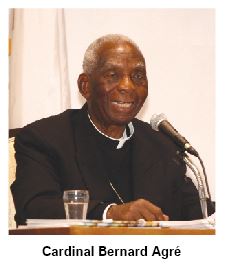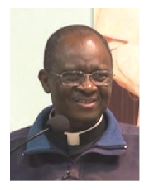
In early June, within five days, our Movement lost two precious friends in Africa (but won by the very fact two powerful intercessors in heaven): on June 4, Most Rev. Joseph Befe Ateba, founding bishop of the diocese Kribi in Cameroon, died at the age of 52, after a short illness. He had taken part in our study week in March 2011 in Rougemont, and had made very good comments.
 On June 9, Cardinal Bernard Agre of Ivory Coast (and Archbishop of Abidjan from 1994 to 2006), died at Paris, France, where he was hospitalized for about two months. He was 88 years old. He came three times in Rougemont to attend our study sessions on economic democracy in 2008 and 2009, and then made a huge work to make ourselves known to all his contacts in Africa and Rome; so he has collaborated to open Africa to the Social Credit cause, since over fifty African bishops came to Rougemont thereafter.
On June 9, Cardinal Bernard Agre of Ivory Coast (and Archbishop of Abidjan from 1994 to 2006), died at Paris, France, where he was hospitalized for about two months. He was 88 years old. He came three times in Rougemont to attend our study sessions on economic democracy in 2008 and 2009, and then made a huge work to make ourselves known to all his contacts in Africa and Rome; so he has collaborated to open Africa to the Social Credit cause, since over fifty African bishops came to Rougemont thereafter.
In June 2008, while he was taking part in the International Eucharistic Congress in Quebec City, Cardinal Agre attended for the first time our week of study in Rougemont on Social Credit (or economic democracy). Being very intelligent, he understood in no time the importance of our battle. The second day of the session, he made the following remark: “If I understand what you have just told us, by creating money out of thin air, banks become the owners of everything!” He had understood very well indeed.
In a message on the occasion of the death of Cardinal Agre, Pope Francis wrote: “The late Cardinal was a man of God, devoted to the proclamation of the Gospel and the human and spiritual development of the people.” Having worked with four other cardinals in the drafting of the Compendium of the Social Doctrine of the Church, Cardinal Agre was deeply dedicated to social justice.
 We were attracted by a statement of Cardinal Agré in Rome in 2004. As a member of the Pontifical Council for Justice and Peace, the Cardinal spoke about “a banking system that constitutes an impassable barrier”, and that Africa could not develop with interest rates of 17 to 20 per cent. This statement prompted us to invite Cardinal Agre to come and visit us; he enjoyed his first visit so much that he came back twice afterwards.
We were attracted by a statement of Cardinal Agré in Rome in 2004. As a member of the Pontifical Council for Justice and Peace, the Cardinal spoke about “a banking system that constitutes an impassable barrier”, and that Africa could not develop with interest rates of 17 to 20 per cent. This statement prompted us to invite Cardinal Agre to come and visit us; he enjoyed his first visit so much that he came back twice afterwards.
In September, 2008, Cardinal Agre wrote the following foreword for our book The Social Credit proposals explained in 10 lessons:
This 150-page manual guides the animators for the weeks of study and the meetings in Rougemont.
With the participants who came from the continents of Africa, America, Europe and Asia, I had the pleasure of taking part in this lively and instructive teaching.
In the line of Louis Even, the founder of this strongly Marian organization that draws its major themes from the Social Doctrine of the Catholic Church, we salute the relevance of the dominant features of Social Credit that calls for a new social world of justice and charity.
Fortunately, the Compendium of the Catholic Church in its recent edition offers a source that enlightens the work that you now hold in your hands in its four fundamental principles, namely:
- The respect of the human person
- The search for the common good
- The principle of subsidiarity
- And solidarity
The Ten Lessons on Social Credit and the Compendium are available in many languages in order to be precious instruments of personal and communal reflection.
We are all concerned by the recurrent misery and poverty of peoples.
How can the lack of the necessities of life on an earth that is so fertile be understood? How can we understand that millions of adults and children die of hunger and malnutrition? How can we understand that countries who are extremely rich, collapse under debts that cannot be paid, due to a global vitiated financial system that holds these countries in capitivity, thanks to a handful of powerful individuals who stand together in evil?
This allows us to hope for our liberation from the banks and their merciless intermediaries. It requires millions of men and women who are enlightened, organized, filled with faith and love, who rise from everywhere to cry out their discontent and build a new national and international environment where “no one goes without the necessities of life.” (Benedict XVI, Deus caritas est, 25.) The Pilgrims of St. Michael have started the fight seventy years ago. There is still a lot of work ahead.
Apostles, men of faith, specialists, men of good will, stand up; it is your turn. Do not be afraid. Christ is alive, and He is the Master of time and history.
Here are excerpts from the reflections of Most Rev. Joseph Befe Ateba (photo), founding Bishop of Kribi, Cameroon, at the end of our session study in March, 2011:
What I have learned here, with much enjoyment, is the origin of money and the motivations behind it, because the monetary and banking system could seem to the world as a natural thing. I appreciated the complimentary information that I received, the revelations on the monetary and banking system, and that it is possible to do otherwise, that money is not consubstantial to our States. We can do otherwise than the system that we now have...
I also learned much about the mechanisms of power in the world, and what most pleased me is the proposition of another possibility. It presents a new social order which would be free of the tutelage of the great monetary and banking powers, which have no other criterion of action other than that of their own interests. It is not man that preoccupies them; not at all! In this they differ fundamentally with the Social Doctrine of the Church.
What struck me also is the proposition to hand over monetary and financial power to its legitimate beneficiaries: to society, the people, to humanity; this is what I learned about from what you call economic democracy, meaning the end of the monopoly of money by those who unjustly appropriate it.
Throughout the presentations, I never stopped wondering how it would be possible to bring this teaching to Africa. For me the concern lies in the awareness of the people: how to get this information to the little people who are the immediate victims of this whole system.
Faced with these systems, these powers, even the most elaborate thought is not sufficient to attack the system because it is so seriously implemented. It has all the means — military and financial resources, systemic, political and diplomatic assets... When you look at this, you say: “What can the small Social Credit do in the face of all of this?”
We have the examples from the Bible. It is in this sense that David found himself in front of Goliath. When you read the story of David, you see that Goliath recalled his victories, and said to David: “Who are you? I can crush you!” David said, “I come to you in the name of Yahweh Sabaoth (the Lord of Hosts)!” He did not advance until David came towards him in the name of Yahweh Sabaoth. And in the end, it was David who had the upper hand. So this could be a repetition of the story of David and Goliath.